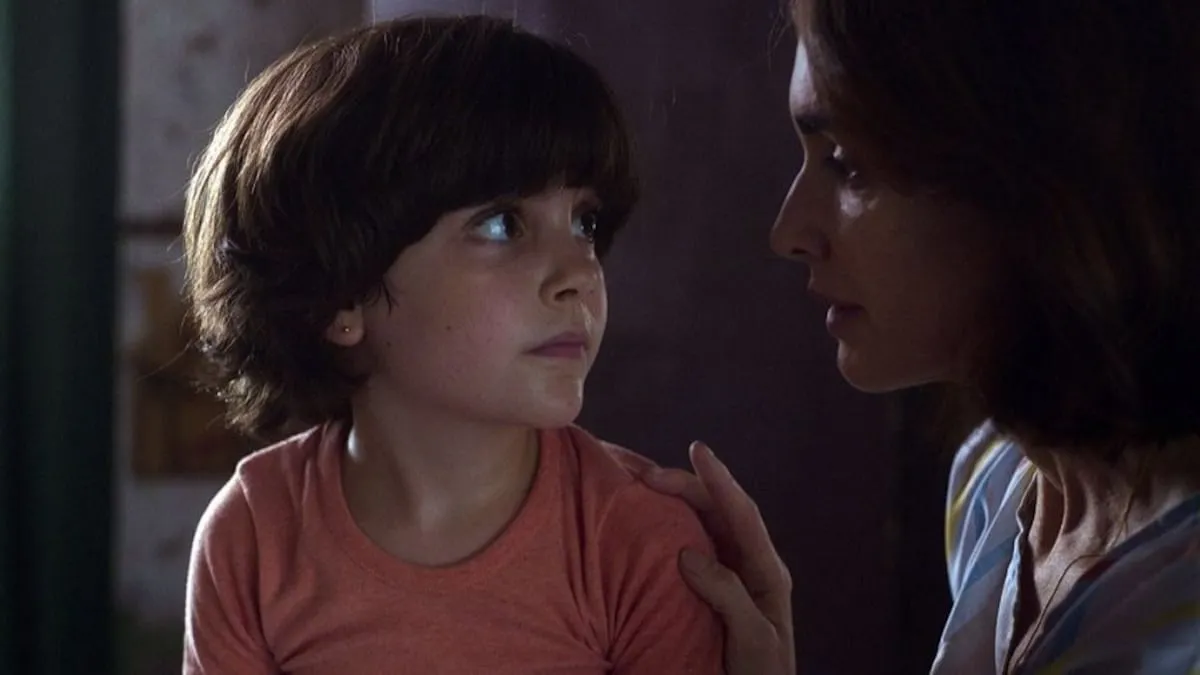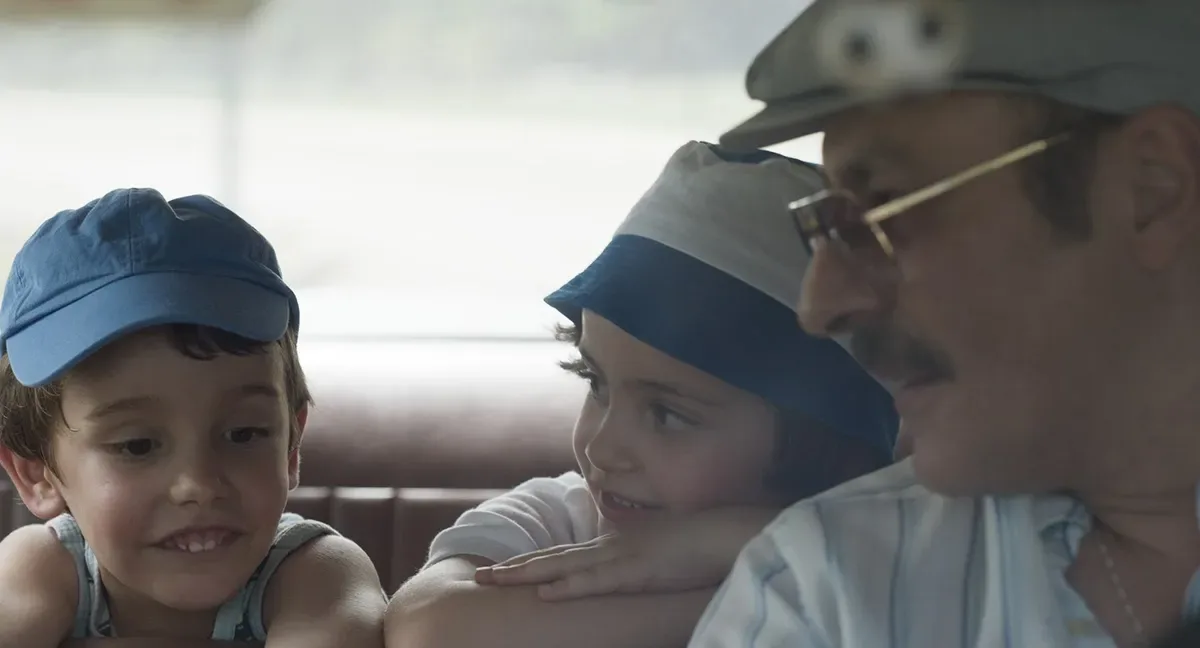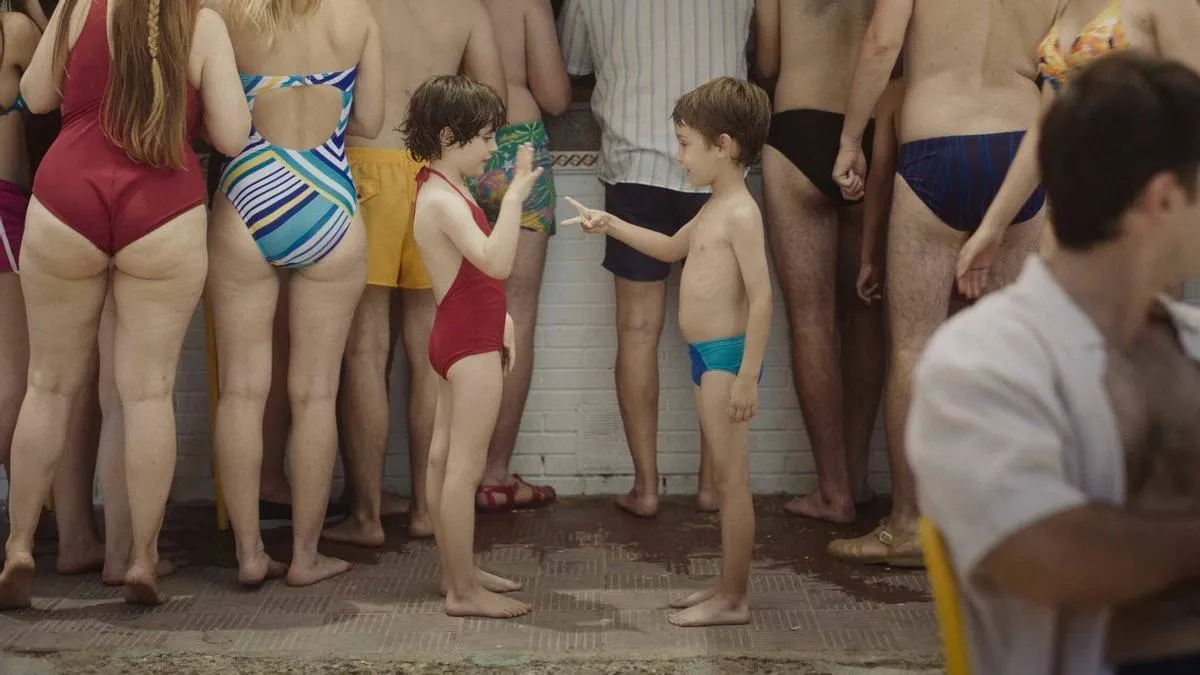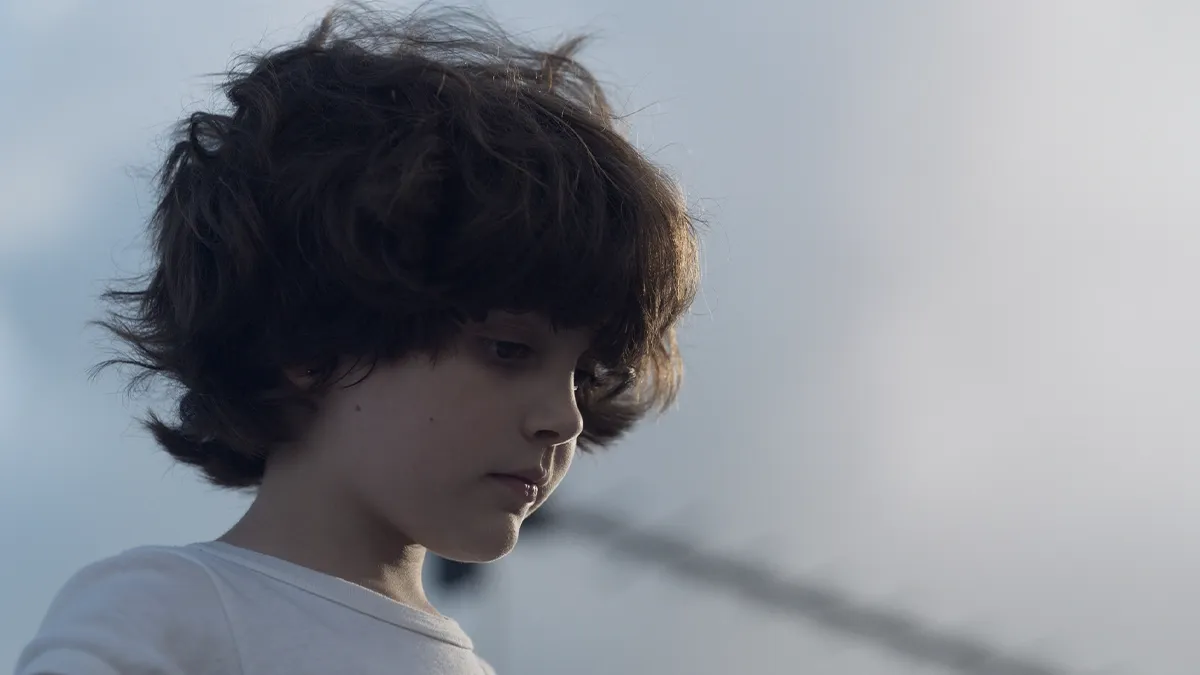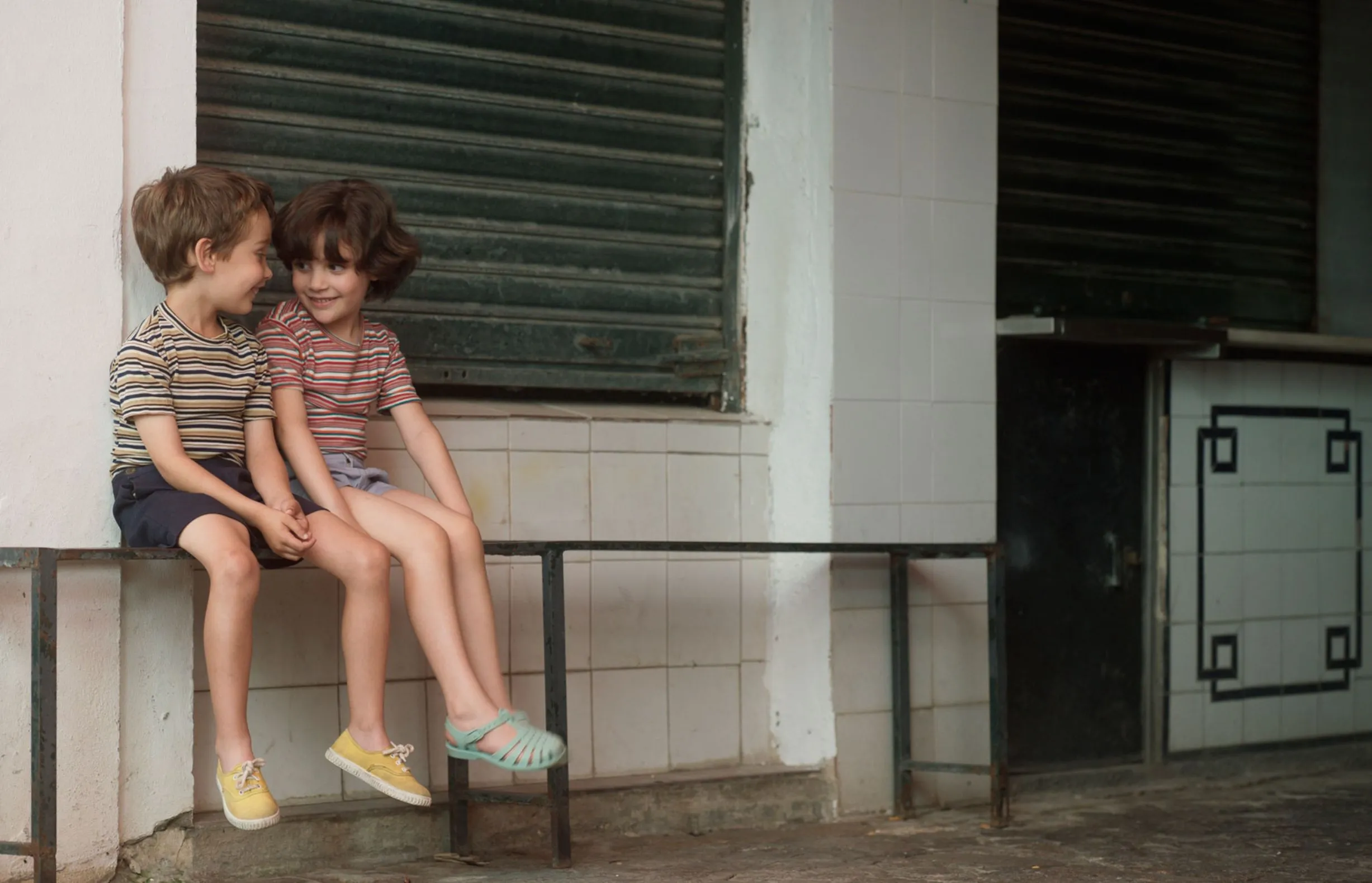The film “Rita” unfolds in the sunny streets of Seville in 1984, creating a tapestry of childhood innocence caught in a web of family problems. “Our main character, Rita, who is seven years old, embodies the duality of youth: she has a lively spirit that longs for the simplicity of summer days but also carries the weight of a broken home.
Along with her sensitive younger brother, Lolo, she has to deal with the heavy presence of their unstable taxi driver father, José Manuel. He hangs over their lives like a specter of despair.
The undercurrents of domestic violence rippling through the children’s existence dampen what should be happy days as they dream of beaches and adventures. The haunting reality of their mother, Mari, cuts through the idyllic surface of summer and shows that a chasm of pain and unspoken fears is often beneath the surface of familial love. Mari’s silent suffering reflects a larger societal malaise.
The innocence of childhood meets the harsh realities of life in this delicate but terrifying narrative, prompting us to ponder the fragility of joy amid the shadows of existence.
The Fragile Veil of Innocence
In “Rita,” the haunting clarity of the delicate interaction between childhood joy and the looming threat of violence is rendered. The film transports us to a sunny world where laughter should be easy to hear, but beneath the happy surface lies a palpable strain.
In contrast to the oppressive reality of their home, where love is overshadowed by fear and uncertainty, Rita and her brother Lolo radiate a childlike innocence. Their summer adventures are punctuated by harsh reminders of their father’s unstable nature—a man whose love is as unpredictable as the summer storms threatening the horizon. Their summer adventures are filled with dreams of the beach and fleeting moments of joy.
What is the nature of childhood in a world tainted by domestic violence? The film does a great job of showing how the mental scars of abuse affect children’s innocent lives, changing how they see things and ruining their lives. Rita’s world is full of color but is also fraught with danger awareness, which no child should have to deal with.
In addition, the film’s examination of gender violence serves as a critical comment on societal norms about masculinity and femininity. The character of José Manuel, who stands for patriarchal authority, shows the sneaky nature of traditional masculinity, where dominance is frequently mistaken for strength. Mari’s quiet suffering mirrors the societal expectation of female endurance, which is a part that many women feel compelled to play.
In this question lies the film’s philosophical question: can real love survive in a place where fear and control are present? The weight of a father’s rage threatens to destroy joy in this narrative landscape, forcing us to confront the uncomfortable truths of human relationships.
Echoes of Despair: A Character Study
The characters in “Rita” show how complicated the relationship between innocence and darkness can be. They all deal with their lives differently, with different levels of awareness and strength. Rita and her younger brother, Lolo, are central to this narrative. Their relationship serves as both a safe haven and a source of tension. Rita is very strong and has an instinctive protective nature, which makes her keep Lolo safe from their angry father.
On the other hand, Lolo has a sensitive soul that is often filled with worry. Because of this, he is easily affected by the chaos around him. Their laughter reverberates against the silence that permeates their home as they travel through a landscape where adult worries taint childhood. Their relationship is a moving mirror of survival; in a world where parental love is waning, they find comfort in one another, but the weight of their reality makes them frequently retreat into the safety of their imaginations.
They have a mother named Mari, who represents the tragic essence of silent pain. Her mental journey is fraught with despair, but it is also punctuated by brief moments of hope. As a woman bound to a marriage that kills her spirit, she embodies the archetype of a strong woman. Her battle turns into a silent protest against the societal norms that mandate her subservience as she struggles with the harsh realities of her existence. While fraught with fear, her attempts to get assistance reveal a glimpse of independence—a desperate search for control in a life ruled by someone else.
José Manuel, the patriarch, stands in sharp contrast. His presence is felt even when he’s not there. His authority is harsh and, paradoxically, tinged with vulnerability, making him a complicated figure. Moments of tenderness occasionally shine through his otherwise intimidating exterior, suggesting a man shackled by his masculinity and fighting his demons in silence.
Can the monster also be a man stressed out by societal expectations? This duality makes for an unsettling reflection. His portrayal forces us to confront uncomfortable truths about masculinity, prompting existential questions about the nature of power, love, and vulnerability within the family. Each character makes their way through their existence in this broken world, leaving us to ponder the shadows of their decisions and the echoes of their pain.
Framing Innocence: A Visual Journey
The 4:3 aspect ratio used in “Rita” is an intentional nod to nostalgia, capturing the essence of a bygone era while highlighting the troubled inner lives of the movie’s young leads. This square format, which looks like old photos, gives the characters’ emotional settings a sense of intimacy and confinement.
The camera, usually set up at a child’s level, lets us into Rita’s world and perceive her experiences through her innocent but sensitive eyes. As the sense of innocence of childhood is contrasted with the harsh realities that are just outside the frame, this perspective not only intensifies the sense of vulnerability but also turns ordinary moments into moving discoveries.
With a color scheme that moves between bright and dark tones, the film’s visual style adds to the narrative depth of the story. Sun-drenched afternoons are punctuated by shadows that creep into the sides of the frame, representing the constant fear of violence that hangs over the family.
Light takes on a personality of its own, casting long shadows that whisper of despair while illuminating brief moments of joy. The children’s laughter is tempered by the chilling awareness of their mother’s silent suffering as they play in open, bright spaces, which creates a dissonance that reverberates throughout the entire film.
Through this interplay of light and shadow, the cinematography captures the fragile beauty of childhood, an existence filled with wonder but also perilously close to darkness. Each frame begs to be considered, compelling us to confront the existential questions that linger between the lines of this touching but scary narrative. In the end, “Rita’s” visual language goes beyond just telling a story; it turns into a meditation on the nature of innocence, memory, and the shadows that eventually follow.
The Art of Contradiction: Directing and Writing in “Rita”
“Rita,” Paz Vega’s first movie as a director, is a delicate act of balancing the joys of childhood with the harsh truths that come with it. Vega crafts a narrative that feels intimate and expansive while navigating the troubled waters of family dysfunction with great sensitivity.
Her skill at contrasting moments of lighthearted play with the looming threat of violence creates a haunting resonance that forces the audience to confront the unsettling truth that joy and sorrow frequently coexist in a delicate balance. The authenticity of each scene is evident, capturing the essence of childhood not as a simple paradise but as a complex interplay of fear and wonder.
One of Vega’s skills is her nuanced depiction of childhood experiences. The world is seen through Rita’s eyes as a canvas of both innocence and deep loss, where the shadows of adult despair dance alongside the laughter. The film’s pacing highlights this duality by allowing moments of silence to linger and highlighting the weight of unspoken fears that suffocate the children’s joy. This steady beat draws us into a deeply emotional landscape, full of the textures of memory and desire.
The dialogue and writing add to this sense of realism by evoking children’s voices struggling with their surroundings. The dialogue is full of real interest and awkwardness, capturing the essence of a young person exploring amid confusion.
However, it’s not just the words that have weight; the silence that follows them also conveys the unthinkable truths that children frequently take in without fully comprehending them. The deliberate and thoughtful pacing gives these still moments of childhood room to breathe, enhancing the emotional impact of the film and inviting us to reflect on the complexities of childhood.
Vega’s direction and writing work together in “Rita” to create a moving examination of existence, urging us to confront the unsettling intersections of innocence and trauma. The light of childhood is often overshadowed by the darker realities of life as the narrative unfolds, leaving us to ponder the paradox of growing up.
The Weight of Silence: Emotional Resonance in “Rita”
“Rita” uniquely makes people feel deeply sorry for the characters, drawing them into the maze of childhood trauma with a disturbing closeness. We are brought into a world where the moments of children’s laughter contrast sharply with an undercurrent of fear from the beginning when the sound of a fan punctuates the stillness of summer in Seville.
Moments that reveal the emotional tension beneath the surface are interspersed throughout the play scenes. One particularly moving scene unfolds as Rita sees her mother’s silent pain and sees the words that aren’t being said in her mother’s gaze, which cuts through her innocence. In these scenes, the movie shows both how fragile childhood happiness can be and how heavy adult depression can be, making us think about how complicated family love can be when it is mixed with violence.
As the film skillfully illustrates the lingering shadows of domestic violence on young minds, the study of childhood trauma is rendered with visceral realism. Through Rita and Lolo’s innocent eyes, we can perceive the subtle ways in which trauma affects their daily lives.
This can be seen in their fearful looks, mad rush to find safety, and desperate need for order in a broken home. The narrative does not hide the sneaky effects of their father’s rage, suggesting that the scars of such experiences go far beyond the present moment and shape their perceptions of love, safety, and self-worth.
In this way, “Rita” serves as both a moving depiction of childhood and a meditation on the long-term effects of trauma, compelling us to confront the uncomfortable truths about the places that shape our identities. Long after the credits roll, the film lingers as a haunting reflection of the delicate interplay between innocence and the realities threatening to break it.
Shadows of the Past: Cultural Resonance in “Rita”
“Rita” unfolds against the backdrop of 1984 Spain, when the effects of the Franco rule linger, and the fight for personal freedom is just beginning. This historical background is important because it shapes the characters’ lives through the social and political environment.
In a patriarchal society, where gender roles are clearly defined, and family structures frequently reflect larger societal norms, the film quietly incorporates these elements into its narrative. Mari’s silent endurance reflects the societal pressures on women to maintain family harmony, regardless of personal cost. At the same time, José Manuel embodies the archetype of masculine authority in this setting, his volatile presence echoing the authoritarian shadows of the past.
Despite being set in the past, “Rita” has much to say about current issues like domestic violence and equal rights for women. The film serves as a powerful reminder that the problems shown are not from a bygone age but reflect current societal issues. The emotional terrain Rita and Lolo travel through challenges contemporary viewers to confront the long-lasting effects of domestic abuse, revealing how these traumas cut across space and time.
In this way, the film goes beyond its particular cultural setting, prompting us to think more deeply about the complexities of family love and the sneaky nature of violence in the home. The haunting echoes of the past reverberate in the present, compelling us to question the systems that keep cycles of abuse and silence going and urging us to reflect on our shared responsibility to eradicate these injustices. Thus, “Rita” serves as both a historical narrative and a modern call to action, weaving together personal and societal struggles in a tapestry that is just as important now as in 1984.
The Review
Rita
Paz Vega's superb film "Rita" is a haunting look at how domestic violence has overshadowed childhood innocence. The film sheds light on the complexities of familial love and trauma through its moving narrative, real performances, and cinematography. It has a profound impact on both past and present problems, prompting important discussions about gender roles and the long-lasting effects of abuse. "Rita" invites viewers to reflect on the delicate balance between joy and despair in the lives of its young protagonists. It is a powerful yet delicate narrative.
PROS
- The film poignantly captures the complexities of childhood and trauma.
- Strong performances, particularly from the child actors, enhance the narrative.
- The cinematography effectively uses light and shadow to convey mood.
- Addresses timeless themes of domestic violence and gender roles.
CONS
- Some viewers may find the pacing slow in certain segments.
- The exploration of dark topics may be uncomfortable for some audiences.
- Certain plot elements may leave viewers seeking clearer resolutions.









































